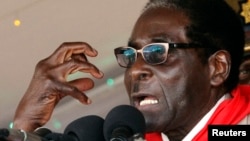Zimbabwe’s High Court has ruled that President Robert Mugabe can postpone by-elections for vacant parliament seats which a superior court had ordered last year.
After hearing the arguments of the President Mugabe's lawyers and for Zimbabweans who want immediate by-elections, High Court chief Justice George Chiweshe said Mugabe’s plea had carried the day.
Tawanda Zhuwarara is from the Zimbabwe Lawyers for Human Rights, which represented those demanding polls to fill parliamentary seats that have been vacant since the country's last elections in 2008. He was not happy with the Friday ruling.
“We are still studying the order conferring with the clients, thereafter we will be able to chart the way forward," said Zhuwarara.
Earlier in the week in court, lawyers for Mugabe’s government said it could not hold the by-elections due to a lack of funds. They said an order for parliamentary by-elections would result in a mini-general election for all parliamentary and municipal seats that have fallen vacant since Zimbabwe's last election in 2008.
They said that would be pointless because a general election could be called as early as June 29 to end the country’s fragile, four-year-old coalition government.
The election became possible when Zimbabwean voters approved a new constitution last month.
The new constitution was a requirement of Prime Minister Morgan Tsvangirai's MDC party and of regional leaders who pressured Mugabe and Tsvangirai to form the coalition government after the disputed and violent 2008 polls.
After hearing the arguments of the President Mugabe's lawyers and for Zimbabweans who want immediate by-elections, High Court chief Justice George Chiweshe said Mugabe’s plea had carried the day.
Tawanda Zhuwarara is from the Zimbabwe Lawyers for Human Rights, which represented those demanding polls to fill parliamentary seats that have been vacant since the country's last elections in 2008. He was not happy with the Friday ruling.
“We are still studying the order conferring with the clients, thereafter we will be able to chart the way forward," said Zhuwarara.
Earlier in the week in court, lawyers for Mugabe’s government said it could not hold the by-elections due to a lack of funds. They said an order for parliamentary by-elections would result in a mini-general election for all parliamentary and municipal seats that have fallen vacant since Zimbabwe's last election in 2008.
They said that would be pointless because a general election could be called as early as June 29 to end the country’s fragile, four-year-old coalition government.
The election became possible when Zimbabwean voters approved a new constitution last month.
The new constitution was a requirement of Prime Minister Morgan Tsvangirai's MDC party and of regional leaders who pressured Mugabe and Tsvangirai to form the coalition government after the disputed and violent 2008 polls.




